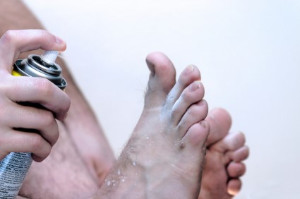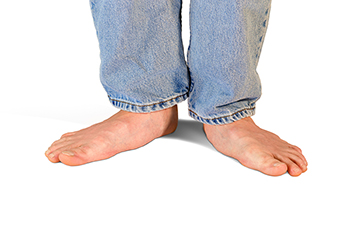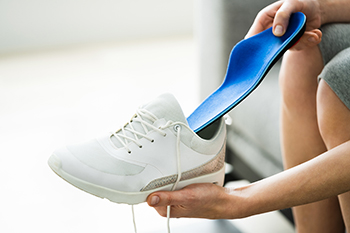Items filtered by date: December 2021
The Many Causes Behind Flat Feet
Flat feet refer to feet that have no visible arch in the middle of the sole of the foot while bearing weight. In other words, while standing, the foot lies flat on the ground. Flat feet can be genetically inherited. They can also be acquired during your lifespan for various reasons. These may include damaged, inflamed, overstretched or torn tendons in the foot, damage to the foot or ankle bones, arthritis, stiffening and weakening of the foot muscles due to nerve damage, obesity, and pregnancy. Acquired flat feet are also associated with aging, as wear and tear on the ligaments that support the arch can cause it to collapse. If you have flat feet that are causing you pain, it is suggested that you seek the care of a podiatrist.
Flatfoot is a condition many people suffer from. If you have flat feet, contact one of our podiatrists from Pennsylvania. Our doctors will treat your foot and ankle needs.
What Are Flat Feet?
Flatfoot is a condition in which the arch of the foot is depressed and the sole of the foot is almost completely in contact with the ground. About 20-30% of the population generally has flat feet because their arches never formed during growth.
Conditions & Problems:
Having flat feet makes it difficult to run or walk because of the stress placed on the ankles.
Alignment – The general alignment of your legs can be disrupted, because the ankles move inward which can cause major discomfort.
Knees – If you have complications with your knees, flat feet can be a contributor to arthritis in that area.
Symptoms
- Pain around the heel or arch area
- Trouble standing on the tip toe
- Swelling around the inside of the ankle
- Flat look to one or both feet
- Having your shoes feel uneven when worn
Treatment
If you are experiencing pain and stress on the foot you may weaken the posterior tibial tendon, which runs around the inside of the ankle.
If you have any questions please feel free to contact one of our offices located in Plymouth Meeting and Ambler, PA . We offer the newest diagnostic and treatment technologies for all your foot and ankle needs.
Benefits of Wearing Custom Orthotics
Many people wear generic shoe inserts and insoles to alleviate minor discomfort in the feet while walking or exercising. But if you have frequent or chronic heel and foot pain, you may be a candidate for custom orthotics. These inserts fit the exact contours of your feet and target the cause of your pain. Orthotics can help to alleviate lower back pain, which often begins in your feet and travels upward. Orthotics also can correct alignment and improve your overall posture. Custom orthotics are designed to address not only your foot problems, but also to take into consideration your weight, height and pain history. If you have ongoing foot, leg, or back discomfort, seek the counsel of a podiatrist who can diagnose the problem, offer treatment options, and prescribe the proper shoe inserts for you.
If you are having discomfort in your feet and would like to try orthotics, contact one of our podiatrists from Pennsylvania. Our doctors can provide the care you need to keep you pain-free and on your feet.
What Are Orthotics?
Orthotics are inserts you can place into your shoes to help with a variety of foot problems such as flat feet or foot pain. Orthotics provide relief and comfort for minor foot and heel pain but can’t correct serious biomechanical problems in your feet.
Over-the-Counter Inserts
Orthotics come in a wide variety of over-the-counter inserts that are used to treat foot pain, heel pain, and minor problems. For example, arch supports can be inserted into your shoes to help correct overarched or flat feet, while gel insoles are often used because they provide comfort and relief from foot and heel pain by alleviating pressure.
Prescription Orthotics
If over-the-counter inserts don’t work for you or if you have a more severe foot concern, it is possible to have your podiatrist prescribe custom orthotics. These high-quality inserts are designed to treat problems such as abnormal motion, plantar fasciitis, and severe forms of heel pain. They can even be used to help patients suffering from diabetes by treating foot ulcers and painful calluses and are usually molded to your feet individually, which allows them to provide full support and comfort.
If you are experiencing minor to severe foot or heel pain, it’s recommended to speak with your podiatrist about the possibilities of using orthotics. A podiatrist can determine which type of orthotic is right for you and allow you to take the first steps towards being pain-free.
If you have any questions please contact one of our offices located in Plymouth Meeting and Ambler, PA . We offer the newest diagnostic and treatment technologies for all your foot and ankle needs.
Arthritis Can Cause Pain in the Feet and Ankles
Risk Factors Associated With Plantar Fasciitis
 Plantar fasciitis is a common foot injury in which the plantar fascia becomes inflamed. The plantar fascia is a ligament that runs along the bottom of the foot, connecting the heel bone to the toes. This ligament can become damaged when it is strained through repetitive overuse or a sudden increase in physical activity, such as running. Standing for prolonged periods of time, exercising on hard surfaces, and wearing shoes that lack proper support or fit poorly can also injure the plantar fascia. People who have flat feet or high arches, are overweight, have had foot or ankle injuries, or are over age 40 are more likely to develop plantar fasciitis. If you are suffering from foot pain, please seek the care of a podiatrist for diagnosis and treatment options.
Plantar fasciitis is a common foot injury in which the plantar fascia becomes inflamed. The plantar fascia is a ligament that runs along the bottom of the foot, connecting the heel bone to the toes. This ligament can become damaged when it is strained through repetitive overuse or a sudden increase in physical activity, such as running. Standing for prolonged periods of time, exercising on hard surfaces, and wearing shoes that lack proper support or fit poorly can also injure the plantar fascia. People who have flat feet or high arches, are overweight, have had foot or ankle injuries, or are over age 40 are more likely to develop plantar fasciitis. If you are suffering from foot pain, please seek the care of a podiatrist for diagnosis and treatment options.
Plantar fasciitis can be very painful and inconvenient. If you are experiencing heel pain or symptoms of plantar fasciitis, contact one of our podiatrists from Pennsylvania. Our doctors can provide the care you need to keep you pain-free and on your feet.
What Is Plantar Fasciitis?
Plantar fasciitis is the inflammation of the thick band of tissue that runs along the bottom of your foot, known as the plantar fascia, and causes mild to severe heel pain.
What Causes Plantar Fasciitis?
- Excessive running
- Non-supportive shoes
- Overpronation
- Repeated stretching and tearing of the plantar fascia
How Can It Be Treated?
- Conservative measures – anti-inflammatories, ice packs, stretching exercises, physical therapy, orthotic devices
- Shockwave therapy – sound waves are sent to the affected area to facilitate healing and are usually used for chronic cases of plantar fasciitis
- Surgery – usually only used as a last resort when all else fails. The plantar fascia can be surgically detached from the heel
While very treatable, plantar fasciitis is definitely not something that should be ignored. Especially in severe cases, speaking to your doctor right away is highly recommended to avoid complications and severe heel pain. Your podiatrist can work with you to provide the appropriate treatment options tailored to your condition.
If you have any questions please feel free to contact one of our offices located in Plymouth Meeting and Ambler, PA . We offer the newest diagnostic and treatment technologies for all your foot and ankle needs.
How Do I Know if My Sneakers Fit Properly?
When it comes to finding the right shoes, it can sometimes be difficult to tell if the shoes fit you properly. Many people believe that shoes need to be “broken in” the first few times that they are worn to be comfortable, but this is not the case. Shoes that are the right size should fit comfortably from the moment you put them on. When it comes to sneakers or running shoes, other fit details to watch for include your heel being locked in place and not slipping or sliding as you walk or run and a snug but not tight fit in the midfoot. The toe box of the shoes should also have about a thumb’s width of space between your longest toe and the front of the shoe. For more information about the importance of properly fitted shoes, please consult with a podiatrist.
Getting the right shoe size is an important part of proper foot health. Seek the assistance of one of our podiatrists from Pennsylvania. Our doctors will provide the care you need to keep you pain-free and on your feet.
Getting the Right Shoe Size
There are many people who wear shoes that are the incorrect size, negatively affecting their feet and posture. Selecting the right shoes is not a difficult process, so long as you keep several things in mind when it comes to choosing the right pair.
- When visiting the shoe store, use the tools available to measure your foot.
- Be sure there is ‘wiggle room’. There should be about an inch between your toes and the tip of your shoes.
- Do not always assume you are the same size, as manufacturers run differently.
- Purchase shoes later in the day, as your feet swell as the day progresses.
- If a shoe is not comfortable, it is not suitable. Most shoes can’t be ‘broken in’, and comfort should be the ultimate goal when it comes to choosing the right pair of shoes
As our feet hold our body weight and keep us moving, it is important to treat them right. Picking the right pair of shoes can provide your feet comfort and mobility without pain.
If you have any questions, please feel free to contact one of our offices located in Plymouth Meeting and Ambler, PA . We offer the newest diagnostic and treatment technologies for all your foot care needs.
Do You Have Athlete’s Foot?
 If you notice a rash on the skin of your feet, mainly between the toes, that is red, itchy, scaly or dry, it may be a sign of a fungal infection known as athlete’s foot. Athlete’s foot can cause other symptoms such as a foul odor, cracked and peeling skin, and a burning sensation. The fungi that cause athlete’s foot often thrive in warm and moist environments which means that it often spreads in areas such as communal showers or public pools. Other ways athlete’s foot can spread include sharing items that touch the feet, as well as touching the infected area directly. Patients who believe that they may have athlete’s foot should consult with a podiatrist for treatment in order to clear the infection and prevent it from spreading.
If you notice a rash on the skin of your feet, mainly between the toes, that is red, itchy, scaly or dry, it may be a sign of a fungal infection known as athlete’s foot. Athlete’s foot can cause other symptoms such as a foul odor, cracked and peeling skin, and a burning sensation. The fungi that cause athlete’s foot often thrive in warm and moist environments which means that it often spreads in areas such as communal showers or public pools. Other ways athlete’s foot can spread include sharing items that touch the feet, as well as touching the infected area directly. Patients who believe that they may have athlete’s foot should consult with a podiatrist for treatment in order to clear the infection and prevent it from spreading.
Athlete’s Foot
Athlete’s foot is often an uncomfortable condition to experience. Thankfully, podiatrists specialize in treating athlete’s foot and offer the best treatment options. If you have any questions about athlete’s foot, consult with one of our podiatrists from Pennsylvania. Our doctors will assess your condition and provide you with quality treatment.
What Is Athlete’s Foot?
Tinea pedis, more commonly known as athlete’s foot, is a non-serious and common fungal infection of the foot. Athlete’s foot is contagious and can be contracted by touching someone who has it or infected surfaces. The most common places contaminated by it are public showers, locker rooms, and swimming pools. Once contracted, it grows on feet that are left inside moist, dark, and warm shoes and socks.
Prevention
The most effective ways to prevent athlete’s foot include:
- Thoroughly washing and drying feet
- Avoid going barefoot in locker rooms and public showers
- Using shower shoes in public showers
- Wearing socks that allow the feet to breathe
- Changing socks and shoes frequently if you sweat a lot
Symptoms
Athlete’s foot initially occurs as a rash between the toes. However, if left undiagnosed, it can spread to the sides and bottom of the feet, toenails, and if touched by hand, the hands themselves. Symptoms include:
- Redness
- Burning
- Itching
- Scaly and peeling skin
Diagnosis and Treatment
Diagnosis is quick and easy. Skin samples will be taken and either viewed under a microscope or sent to a lab for testing. Sometimes, a podiatrist can diagnose it based on simply looking at it. Once confirmed, treatment options include oral and topical antifungal medications.
If you have any questions, please feel free to contact one of our offices located in Plymouth Meeting and Ambler, PA . We offer the newest diagnostic and treatment technologies for all your foot care needs.




